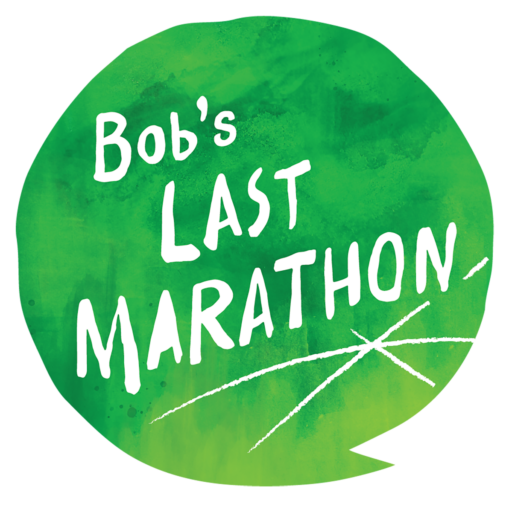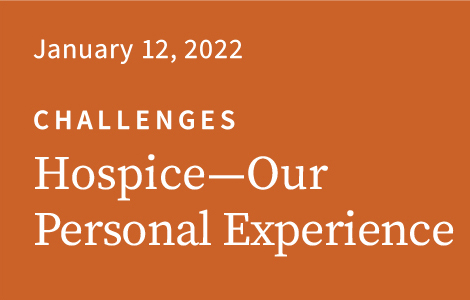Transcript
Hospice—Our Personal Experience
Lena: Hi, I’m Lena. And it is my pleasure to share today’s podcast with Judith Johanson, a member of the Alzheimer’s Disease Research Center at Massachusetts General Hospital. For 37 years she was married to Steve, who was diagnosed with Alzheimer’s disease at the age of 59.
Judy and I bonded while developing the Bob’s Last Marathon podcast. And our friendship deepened as we shared stories about our husbands, our profound love for them, and our journeys through Alzheimer’s.
Our journeys also ended similarly—with hospice. As a signal for the end stage of life, hospice is an emotionally difficult time for anyone. As is the case for many family members of people with Alzheimer’s disease or other dementia, like Judy and me, there is the extra burden of having to make the choice for our loved ones, not ourselves.
The process of making the right decision can elicit complex emotions and questions. Guilt may arise as we ask ourselves if we have really done our very best, and whether we’re denying our loved ones that last possible remedy. We are already familiar with regret over the time lost with our loved one due to disease—but hospice brings another dimension, as we know it may curtail our time together even more. And the whole process is layered with the nagging doubt, Is this the right decision?
But now, almost three years after Bob’s passing, as I look back on my decision to have him spend the last months of his life in the comfort of our home, free to eat the foods he loved, free of medical intervention and hospital routines, I feel secure that Bob would have approved.
Judy: In the past, hearing about people being “on hospice” always gave me a sinking feeling. It conjured images of people facing imminent death and feelings of hopelessness. But by the time I faced this decision for Steve, I was somewhat prepared. With my father needing hospice a year and a half before Steve, and my sister becoming a hospice volunteer coordinator, I found that my outdated and misinformed ideas about hospice flew out the window. I learned that hospice didn’t mean giving up on Steve. Instead, I started to see it as a rational choice: This terminal, progressive disease has already taken so much from him, from us—how can I give him more? I wanted this time to be as comfortable and fulfilling as it could be!
Lena: It was the beginning of 2018. In our New Year’s email exchange, Bob’s physician, Dr. Arnold, suggested we talk about what he called an “existential issue.” When we actually did speak, Dr. Arnold told me I might be faced with “some choices” one day. For example, he said, there might be a time when we would have to reject interventions, such as antibiotics treatment for an infection. I didn’t make light of it—nor did I get overly alarmed. I filed it away in the back of my mind.
Nine months later, Bob entered hospice.
Judy: Six years after Steve’s diagnosis, we could no longer hold back the surging and relentless rogue tide of Alzheimer’s. In October 2017, he had a particularly tumultuous morning, pacing, tipping furniture—it was as if his brain were short-circuiting. Alzheimer’s had taken complete and chaotic control, and I took Steve to the emergency room, where he stayed for four days … followed by a month in a geriatric psychiatric ward. During this short time, Steve lost his ability to walk, talk, and feed himself, and much to our dismay, he entered a long-term skilled nursing facility specializing in memory disorders.
Over his next few months in the facility, I kept a journal record of the names of his nurses, his medications, changes in his weight, what he ate, how he slept, and other details. By February of 2018, I had noticed a worrisome trend: Steve was sleeping more and his weight was declining. At my next team planning meeting, I decided to broach the subject of hospice.
Steve’s team at the facility did not agree he was hospice-ready. They focused on what Steve would lose on hospice: physical therapy, occupational therapy, and most medications. However, when the social worker and I pointed out that he’d lost 30 pounds over three months, and could no longer walk, we decided to explore palliative care.
Needless to say, Steve’s assessment proved it was too late for palliative care, and perhaps he was ready for hospice. In our discussion, the facility mentioned that sometimes people with Alzheimer’s stayed on hospice care for a long time, and there was a chance he would “graduate”—that is, move into another three-month segment of hospice. These words were so helpful for me. It made me feel less guilty about whether I was maybe jumping the gun on this decision. My viewpoint shifted: I wasn’t trying to rush Steve out of this world, I was ushering in comfort.
Lena: As it turned out, Dr. Arnold’s infection example was prescient. What started as something as seemingly innocuous as a blister from a too-tight pair of shoes turned into an infection that didn’t seem to want to go away. After Bob had received expert podiatry care, his primary physician worked with an infectious disease specialist who tried a series of antibiotic options—none of which worked. Eventually we were referred to a vascular surgeon—who got high marks for clinical expertise but had a rather rudimentary bedside manner. I remember her telling me that Bob needed an “AKA.” What was that? She explained that it meant “above-the-knee amputation.”
It was clear to me that Bob had suffered enough.
Several events converged to help me decide Bob was ready for hospice care. A year or so before Bob’s infection, I had faced another difficult decision: Bob’s heart valve defect had reached a point where he needed surgery. Knowing the challenges of recovery for the average person, I had opted against it for Bob.
I had a meeting with the hospice team to discuss my conversation with the vascular surgeon. When I entered the room, waiting for me were the hospice team, including the clinician and chaplain, and my daughter. When I broached the topic of AKA, the clinician and head of the hospice team were clear: They sternly and supportively agreed with me. It was time to end medical interventions, and time to focus on Bob’s comfort.
Judy: The drive to meet the hospice nurse was surreal … I remember thinking, I am going to sign my husband up for hospice today …
I had imagined many things for our lives, but never visualized signing papers signifying the end of my husband’s life.
I felt so alone.
But, as it turned out, I wasn’t. During my meeting, I turned briefly to reach for my folder, and when I turned back, almost magically, our dear friend and spiritual advisor appeared. The mood of the room changed entirely as the nurse described the range of services hospice offered—music, massage, spiritual council, pet therapy, someone who would keep him company at times when I couldn’t be there … plus his own nurse, social worker, and more.
It sounded more like a spa than a dreaded sentence. From then on, I referred to hospice as “hospa” (hos-spa). This term helped ease people’s discomfort—the same discomfort I used to feel.
When I told a friend that Steve had been admitted to hospice care, they said, “Oh, you’re giving up on him?” I responded, “On the contrary, I want EVERYTHING for him.”
Lena: My daughter and I chose home hospice. And what marathoners call the last 384 yards began, the last leg of our long journey with Alzheimer’s. Almost three months to the date, on November 13, 2018, when Bob’s primary care doctor was musing about whether he would graduate from hospice, Bob passed away peacefully in his sleep.
Judy: In the context of our relationship, I elaborate for hours on why hospice was a loving and compassionate choice for Steve—anyone who knew “us” knew we would always do what was best for each other.
For me, everything about hospice was a plus. I could leave Steve knowing someone dedicated to his care would be there to sit with him and comfort him—and give me the comfort and assurance Steve was well cared for. Steve’s mother had prepared well for a safe and loving birth for Steve 65 years prior. Now it was my turn to offer the bookend by giving him all he needed for a safe and loving exit from this life.
Hospice helped me offer that to him.
Steve went off in peace on April 2,2018.
Judith Johanson
MADRC Longitudinal Cohort Coordinator
Massachusetts General Hospital
Board Member
Massachusetts/New Hampshire chapter
Alzheimer’s Association
www.madrc.org
Lena Chow Kuhar

